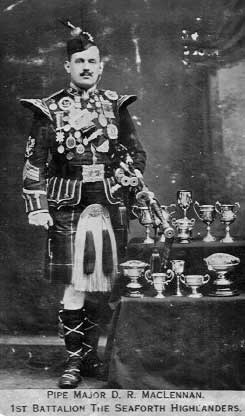Donald Ross (“D.R.”) MacLennan
(1901-1984)
 D. R. MacLennan was born in Edinburgh in 1901, son of Lieutenant and Edinburgh Police Superintendent John McLennan, well known authority on pipe music and one of the most prominent piping figures of the day.
D. R. MacLennan was born in Edinburgh in 1901, son of Lieutenant and Edinburgh Police Superintendent John McLennan, well known authority on pipe music and one of the most prominent piping figures of the day.
D. R. was a younger half-brother of G. S. McLennan and a cousin to the almost equally famous Highland dancer and piper William McLennan. Originally taught pipes by his father, he was later a pupil of Willie Ross and John MacDonald of Inverness.
He enlisted in the Scots Guards in 1919, but transferred in 1925 to the Seaforth Highlanders at Fort George, where he was named Pipe Major of the 1st Battalion. He would hold this post for 13 years. He returned to Fort George in 1938 and spent the war years as Regimental Sergeant Major of the Infantry Training Centre until he was commissioned into the Seaforths. He retired as a Captain in 1948.
He won prizes as a piper, dancer and athlete early in his career, though he would not win the premier prizes until 1956, having been talked into returning to the competition platform by friends a few years earlier. He justified their faith in him by achieving the extraordinary feat of winning the Gold Medals at Oban and Inverness in the same year at the age of 55.
He contributed to the 1935 production of The Standard Settings of the Seaforth Highlanders, perhaps the most popular collection of its day until it was eclipsed by the first Scots Guards collection in 1954.
After he retired he devoted his life to piping as a competitor, judge, composer and authority on the music, history and players of the pipe. His bearing and deportment during his playing days were beyond reproach and considered by many to be a model to be emulated.
In his 1988 book, The Northern Meeting, author Angus Fairrie wrote of him:
While George was pre-eminent in his day as a composer of the highest ability, as well as a piper, Donald fitted naturally into the role of elder statesman in his later years. His knowledge of pipers and piping was immense, and with his death in 1984 much piping lore also was lost. He, like so many others, steadfastly refused to write or publish is own piping testament.
Seumas MacNeill once wrote of him in the Piping Times:
Whenever I had a problem regarding a person or a tune, the easy way out was to phone Donald.
Dr. William Donaldson writes of him in his 2005 publication Pipers that he was:
…one of the earliest professional pipers to become a member of the Piobaireachd Society, and the most important reedmaker of his generation.
Dr. Donaldson later wrote:
When I was a kid, everybody got their reeds from D. R. in North Berwick. Many of us played Bob Nicol’s chanter reeds, but the drone reeds always came from D. R. I remember that cash in advance was the rule – money, not cheques.
Long an unofficial keeper of much of his half-brother G. S.’s memorabilia, in 1954 he entered an untitled, unpublished and unplayed 6/8 march of his brother’s in a composing competition organized to find a tune to commemorate the Braemar Gathering. He altered some of the technique to disguise his brother’s distinctive gracenoting style and the tune won the contest. Thanks to D. R. MacLennan’s efforts, The Braemar Gathering today stands as one of the best of G. S. McLennan’s many great compositions.
D. R. MacLennan died on February 7, 1984. A Scots Guards honour guard and Pipe Major John A. MacLellan, heir to Willie Ross at the Army School of Piping, piped a suitable send-off.
JM, 2006
-with notes from Piping Times, March 1973, May 1984 and ‘Piping Traditions of The North of Scotland’, by Bridget MacKenzie, 1998, ‘The Northern Meeting’ by Angus Fairrie, 1988, and private communication with Dr. William Donaldson.

2 Comments
Thanks so much for this! I had the great luck to study for a few summers with D.R. back in the early ’70s. As an innocent American, I got his name from J.R. Glen, I think, in Edinburgh. I’d go out to North Berwick every week or two for lessons, mainly on Pibroch. As a former sax player, I knew nothing about the pipes, but something about reeds, and D.R.’s were superb and, as he said they would, they’ve lasted a lifetime. I was in awe of D.R.’s playing–the elegance and nuance of his phrasing, the precision of his technique; and even as I struggled impossibly to emulate him, he was ever patient and extraordinarily generous. He would not allow me to offer him any payment for his time, accepting only a single malt now and then. D.R. talked a little about G.S. and his piping background, but this brief bio painted a fuller picture that is wonderful to have.
Ed Neigh told us the story that he was a fearsome judge. A fellow Canadian apparently played a fine rendition of a GS tune for DR only to be brusquely told “That’s not the way my brother wrote it!” And that was that!